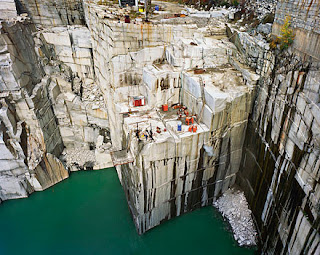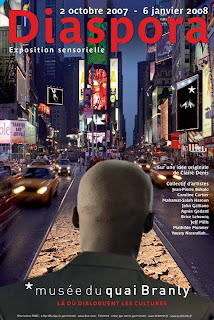



 Een van de meest fascinerende fotografen van deze tijd is Edward Burtynsky, de man over wiens werk de filmdocumentaire Manufactures Lanscapes is gemaakt. Ik kwam er pas net achter dat zijn werk in Helmond wordt tentoongesteld. Gaat het zien als u tijd heeft en zegt het voort!
Een van de meest fascinerende fotografen van deze tijd is Edward Burtynsky, de man over wiens werk de filmdocumentaire Manufactures Lanscapes is gemaakt. Ik kwam er pas net achter dat zijn werk in Helmond wordt tentoongesteld. Gaat het zien als u tijd heeft en zegt het voort!Edward Burtynsky Foto’s - Industrial landscapes
De sloop van afgedankte tankers in Bangladesh, het veranderende stadsbeeld in China door de snelle industrialisatie, de invloed van mijnbouw op de natuur in Noord-Amerika en Europa. Het zijn een paar van de thema’s die de Canadese kunstenaar Edward Burtynsky kiest voor zijn fotowerken.
Grootste museale tentoonstellingIn de expositie zijn ruim zeventig groot formaat werken te zien van deze fotograaf die al vele prijzen won voor zijn oeuvre. Na talloze exposities in Noord-Amerika is het de eerste keer dat in Europa een zo grote museale overzichtstentoonstelling van Burtynsky te zien is.
Industriële landschapsfotografieEdward Burtynsky (*1955 Sint-Catharines, Canada) specialiseert zich sinds eind jaren zeventig in industriële landschapsfotografie. Hij maakt ons bewust van wat wij met onze consumptiebehoefte aanrichten in de wereld. Zijn foto’s zijn niet als donderpreek bedoeld. Burtynsky beseft dat we allemaal deel uitmaken van dit veranderingsproces en dat we er ook de vruchten van plukken. Een van de grootste dilemma’s van onze tijd weet hij te visualiseren. Zijn kleurenfoto’s stralen geen zwartgalligheid uit, maar juist schoonheid. Burtynsky weet als een 19e-eeuwse fijnschilder zelfs de kleinste details vast te leggen. Scheepswrakken krijgen de grandeur van metalen sculpturen. Zijn opnames van China tonen een volledig verwesterd land, maar tegelijkertijd zie je in één oogopslag dat ze nergens anders genomen kunnen zijn. Zo goed weet hij het typisch Chinese te treffen.De foto’s zijn rijk aan details, ondanks hun sterk panoramisch karakter. Uitgaande van de zichtbare werkelijkheid componeert hij een perfecte balans tussen ordening en rust versus verstoring en ritmiek. Het lelijke, vluchtige en tijdelijke van de hedendaagse maatschappij wordt bij hem ongevormd tot schoonheid, rust en eeuwigheid.
WaarschuwenDoor al deze schoonheid heen waarschuwt de kunstenaar ons. Op zijn website zegt hij: ‘Deze beelden zijn een metafoor voor het dilemma van ons bestaan. Ze zoeken de dialoog tussen afschuw en aantrekking, tussen verleiding en angst. Wij worden gedreven door verlangen: een kans op een beter bestaan. Toch weten we bewust of onbewust dat de wereld moet lijden voor deze zucht naar succes. Onze afhankelijkheid van de natuur om ons de grondstoffen te verschaffen voor onze consumptie en onze bezorgdheid voor het welzijn van onze planeet plaatst ons voor een ongemakkelijk dilemma. Mijn foto’s functioneren als spiegelde plassen van onze tijd.’
ErkenningEen aantal van Burtynkys foto’s is opgenomen in de collecties van de vijftien grootste musea ter wereld waaronder The National Gallery of Canada, La Bibliothéque Nationale de Paris, The Museum of Modern Art en het Guggenheim Museum in New York. De Vereniging van Vrienden heeft vorig jaar veertien foto’s van Burtynsky aangekocht voor het Gemeentemuseum Helmond. Deze zijn uiteraard ook te zien in de tentoonstelling. '





























